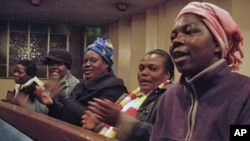Zimbabwe's growing exile community in South Africa is struggling with many issues, such as bureaucratic hassles, losing their rights in their home country and a lack of opportunities in their new country.
There is shouting and jostling, as hundreds of Zimbabweans wait inside the compound of South Africa's Department of Home Affairs in an attempt to get or renew their asylum papers.
Outside, Samuel Bango feels lucky because he finally got his own papers renewed.
He says he left neighboring Zimbabwe because he could not feed his family anymore as inflation and political violence became unbearable.
Austin Mamvura explains it took three weeks for him to get his own asylum papers. He tries to get by in South Africa by selling cookies to other Zimbabweans waiting in line.
Many Zimbabweans say that in addition to the bureaucratic hassles, they face discrimination in public places, and the constant threat of xenophobic violence.
At human rights offices in Pretoria, Zimbabwean lawyer Gabriel Shumba says it is not just in South Africa where his fellow nationals feel at a loss. He feels frustrated exiled Zimbabweans cannot more easily help improve the situation in their own country.
"In terms of Zimbabwe's political realities, the deliberate sidelining or disenfranchisement of people who have been forced to flee their country in particular for national processes such as the constitutional reform exercise, such as national healing issues, such as even elections," said Shumba. "There are over four millions Zimbabweans who are now currently in exile, who are people who are unable to vote for a new government in their own country."
Other exiled Zimbabweans are concerned about bare survival.
Unemployed, homeless and hungry, they have found refuge at the Central Methodist Church in a noisy section of downtown Johannesburg.
Offices have been converted into cramped quarters, where families huddle together.
The church's lobby has been converted into a market area and also a place to dry laundry.
One of the jobless living here, Isaac Matanda, was previously a local government administrator in Zimbabwe. He fled by foot last year because he feared for his life due to his opposition political activities.
"Things have not been so comfortable to date, because I am still in search despite that I have got high qualifications," said Matanda. "I am trying to run around."
At night before bedtime, exiled Zimbabweans come together to sing and pray for better days.
The man behind the church's generosity is Bishop Paul Verryn.
"We deal with almost every possible human difficulty that you possibly can," said Bishop Verryn. "There are relationship problems, there is violence, there is sometimes alcohol, it is a problem in the building. It is not smooth sailing and there are not any easy and quick answers."
Bishop Verryn gives nightly sermons where he also advertises available jobs in South Africa which he hears about.
The services are well attended. Exiled Zimbabweans say they are a moment of reprieve in turbulent and desolate times away from home.
At the end of the service, when the bishop asks who wants special prayers and a sprinkle with holy water, dozens of adults rush forward with their children, hoping they will have a better life eventually, wherever that may be.
This is an updated version of a story first posted July 14, 2011




